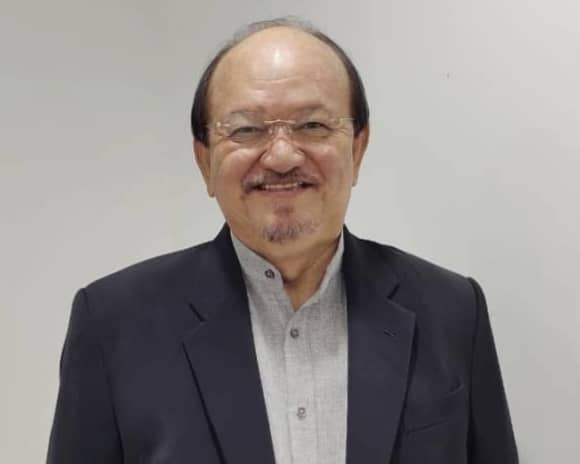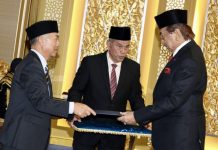KOTA KINABALU: A Parti Bersatu Sabah (PBS) leader welcomed and supported the call for a fast-track lane mechanism for late MyKad applications in rural areas of Sabah but reminded that this should be strictly meant only for undocumented children of Malaysian parents and not for undocumented illegal immigrants residing in Sabah.
PBS Supreme Council Member Datuk William Majimbon said he personally welcomed and seconded the fast-track lane mechanism through the procurement of mobile registration trucks proposed by Kota Belud MP Isnaraissah Munirah Majilis of Parti Warisan to cater for the National Registration Department’s (NRD) outreach programmes to the rural areas in Sabah.
“However, I reserve some concerns and further recommendations over this mechanism.
“Preliminarily, we must distinguish between “late MyKad applicants or undocumented children of Malaysian parents” and “undocumented illegal immigrants residing in Sabah”. The former are disenfranchised individuals who are disadvantaged either socio-economically or circumstantially through geographic inaccessibility. However, the latter are individuals who have entered Sabah through illegal means and without adhering to the proper legal procedures and immigration requirements in Sabah.
“The distinction between these two groups of individuals is necessary to ensure that proper policies are catered to those who are of genuine Sabah origins and not to benefit those who are illegally residing in Sabah. Unfortunately, Warisan has failed to expressly make this clear.
“My first concern regarding the proposed mechanism is the verification of documents through the Native Courts of Sabah.
“The basis for such concern includes the fact that such verification is without the sanction of law. It is the position of the law that the powers to verify documents relating to identity card registrations are outside the purviews of the Native Courts provided under the Native Courts Enactment 1992. This is not the same as the powers of the Native Courts to declare an applicant as “Native” under section 3 of the Interpretation (Definition of Native) Ordinance 1952.
“However, I would suggest that is not only timely but also necessary for the law to be amended to provide jurisdiction to the Native Courts in the verification process of a MyKad application. This includes a top-down effect and delegation of powers of the Native Courts to the Ketua Kampung of each village in Sabah. I fully support this move as I believe that the Ketua Kampung would be the most fitting authority to verify the origins and residency of applicants in the rural areas of Sabah.
“Unless the law is amended to provide such powers, the verification by the Ketua Kampung is without authority and unrecognised by several government agencies and ministries. Unfortunately, this is the reality of events which has transpired where local Sabahans are denied their rightful privileges in medical treatments and education opportunities despite a letter of verification from the Ketua Kampung. Ideally, the verifications ought to have administrative acknowledgement and effectivity,” he said in a statement today.
Wiliam said his second concern regarding the proposed mechanism is its transparency.
He said realistically, there is a real risk of perversion as we must take cognisance of the fact that not all districts or villages in Sabah hold a majority population of Natives or even local Sabahans as a matter of fact.
There are isolated areas in Sabah where squatters of illegal immigrants are administratively recognised as “villages”, he said, adding he firmly recommended that there ought to be an additional mechanism for check and balance on the proposed mechanism to ensure that it is not abused or taken advantage of by irresponsible attempts to legalise what is illegal.
William, who is also the Inanam Community Development Leader (PPM), said his third concern involves the allegations made by Warisan that there are numerous undocumented Sabahan families in Inanam which is unwarranted and without basis.
“As the PPM of N.18 Inanam, it has been the firm mission of our unit to orchestrate and assemble newly appointed Native Leaders and Ketua Kampung in Inanam to identify these undocumented families within their villages.
“Although isolated, we have discovered that a majority of these issues with non-documentation or late MyKad registration is not an issue of accessibility, administration or poverty but an issue of mixed marriages between locals and illegal immigrants. Thereon, issues relating to the validity of their marriages would jeopardise the process of MyKad registration for the children resulting from such marriages.
“Further issues of estranged or divorced spouses also contribute to the difficulty of providing all the necessary documents for registration of the child where one parent has deserted the family. This is where the verification by the Native Courts is necessary,” he explained.
William said both the State and Federal Governments ought to take a more inclusive and comprehensive approach to the issue of non-documentation or late MyKad registration in Sabah.
“There ought to be a more practical, fool-proof and effective mechanism to tackle this generational cycle of non-registration.
“Generations of genuine Sabahans including the Natives of Sabah have been deprived of their rights and privileges as citizens of Malaysia because of this defect in policy. After 60 years of nationhood, we ought to do better for our fellow Sabahans,” he stressed.-pr/BNN






